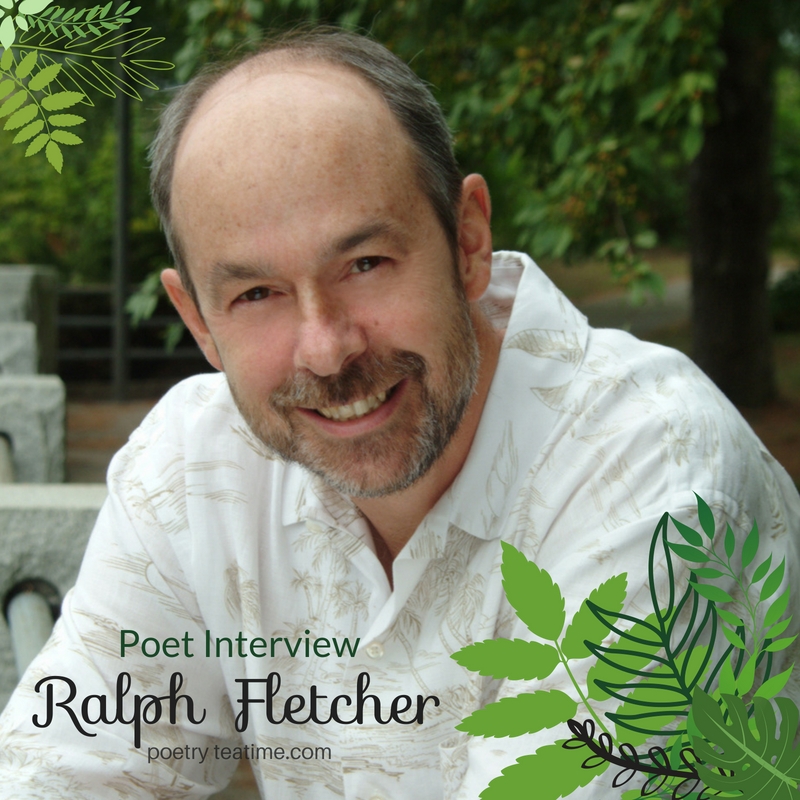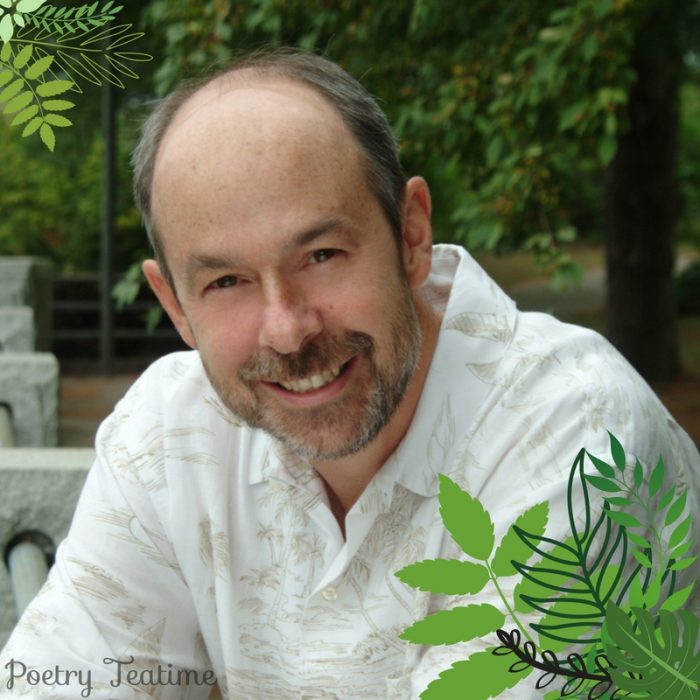Today we’re welcoming one of our favorite wordsmiths and writers-about-writing, the wonderful Ralph Fletcher. He is the prolific author of dozens of children’s books, ten volumes of poetry, and seven books on writing for kids. He has a knack for capturing children’s voices and celebrating the individuality of each person’s perspective. Join us today to learn from his wisdom and get inspired by his creativity!
[This post contains Amazon affiliate links. When you click on those links to make purchases,
Poetry Teatime receives compensation at no extra cost to you. Thank you!]
Welcome to the blog, Ralph! Let’s start with your advice on writing. What are some of your tips for creative writing as a family?
- Let your child see you write. Demonstrate both real world writing as well as writing for fun.
- Look for comfortable, low-pressure “writing occasions” where both you and your child can write and share.
- Get material (notebook, blank paper, markers, pre-made booklets) to make writing enjoyable.
- Tips for responding to a young person’s writing:
- React first as a reader. Show how the writing affects you by responding to the meaning: “This is funny!” Or: “I didn’t know that!”
- Try not to fixate on spelling or grammatical errors.
- Be positive. Build on strengths. Find specific things to praise in the writing.
- Respect the child’s ownership of the writing.
- Suggest another reader, or a real-world purpose for the writing: “I bet Grandma would love to read that!”
- For our youngest (pre-K and kindergarten) writers—
- Remember that much of the meaning is carried in the drawing. Show real interest in the drawing as well as the words.
- Think of emergent writing as early talk—full of approximations and errors we can delight in. These are necessary.
- Keep reading to your child—even when he or she gets older.
- Remember that writers of every age break easily. Be gentle.
Thanks for these great tips! On a related topic, in your books on writing, you don't shy away from having kids explore emotional or controversial subjects. Why do you think it's important to let kids explore difficult aspects of life in their writing?
Being a human being involves joy, celebration, triumph but also betrayal, pain, disappointment, anger. That’s just part of the deal. It’s true that writing about difficult things doesn’t solve them. But kids feel a release in being to express their feelings in a safe place. And in writing about a difficult issue, they often begin to understand it better, and maybe to accept it. There’s a power in being to name it through words.
A lot of your work is based on your own life. What's the best part of writing about your life?
Writing has taught me this: Writers are not people who have amazing lives. Writers are people who find the interesting stories in their ordinary lives. I’ve been surprised to discover that even my everyday stories can be meaningful to other people, if I can write them well. When people read my books, and tell me they can relate to them, I feel a connection. I don’t feel so alone.
What would you say to kids who think their life and experiences are too boring to write about?
Students: your life isn’t boring! Author Sandra Cisneros says: “Do the writing only you can do.” Every one of us is an expert on something…playing video games, being able to make your brother laugh in church, feeding a bottle to a one year old, making the World’s Greatest Sandwich! Any one of those things can provide great material to write about.
Your works on writing often include quotes and interviews from other writers. What is your favorite part about asking writers for their advice?
It’s interesting to hear writers talk about writing because every writer is different, and yet the process one writer uses will be familiar to any other writer. We are comrades-in-arms. Best advice about writing: “The bigger the issue, the smaller you write.” (Richard Price) Select telling details that communicate bigger truths.
One of the things that makes your writing so powerful is the way you capture a young boy's voice looking out at the world. How do you do that?
That’s a big question. How do you find and express in a convincing manner the voice of an eleven year old? It’s kind of a mystery, really. I do believe we all have our previous selves nestled inside of us, like Russian dolls. We just have to find them, and let them speak. It’s a matter of half-pretending and half-channeling that inner self.
You talk about protecting the environment in some of your writing. How do concerns about the world shape your work?
Well, I try not to proselytize. “If you want to send a message,” one of my writing teachers once said, “then go to Western Union.” I don’t want to lecture. But if there’s a natural way for me to
include my passions (habitat preservation, global warming, recycling, lessening our carbon footprint) I could maybe weave it in. But it has to fit. The story comes first, always.
You love to talk about capturing “persnickety questions” that bug each of us and make us want to know more about the world. What’s one of those questions that’s currently tugging on you?
Ha! Well, let me see… I have been thinking about an electronic version of the writer’s notebook. It seems the world is moving that way, but what would it look like? How would you make it feel intimate and personal? Maybe the notebook should stay as a paper and pen kind of thing. I’m still trying to puzzle this out.
Any projects you're working on now that you'd like to share?
Many readers have read my memoir Marshfield Dreams. This winter I will publish a second memoir. It’s not a sequel in time…the stories all involve the years I spent growing up in Marshfield. I am [also] working on a book of nonfiction poetry, “Speak, Cormorant,” that consists of my original poems and photographs.
Thank you so much for your wealth of wisdom, Ralph! And thanks for joining us today!
Be sure to check out Ralph’s website and Twitter to catch up on his latest news and discover all his new releases. Also, read his wonderful books on writing, works of fiction, autobiographies, and poetry books below.
Some Books by Ralph Fletcher
Poetry Matters: Writing a Poem from the Inside Out
A Writing Kind of Day: Poems for Young Poets
A Writer’s Notebook: Unlocking the Writer Within You
Guy-Write: What Every Guy Writer Needs to Know
How Writers Work: Finding a Writing Process that Works for You
Joy Write: Cultivating High-Impact, Low-Stakes Writing
The Writing Teacher's Companion: Embracing Choice, Voice, Purpose, and Play
Boy Writers: Reclaiming Their Voices
Hello, Harvest Moon
Room Enough for Love
Twilight Comes Twice
Relatively Speaking: Poems about Family
Marshfield Dreams: When I Was a Kid
Flying Solo
Fig Pudding
Spider Boy



